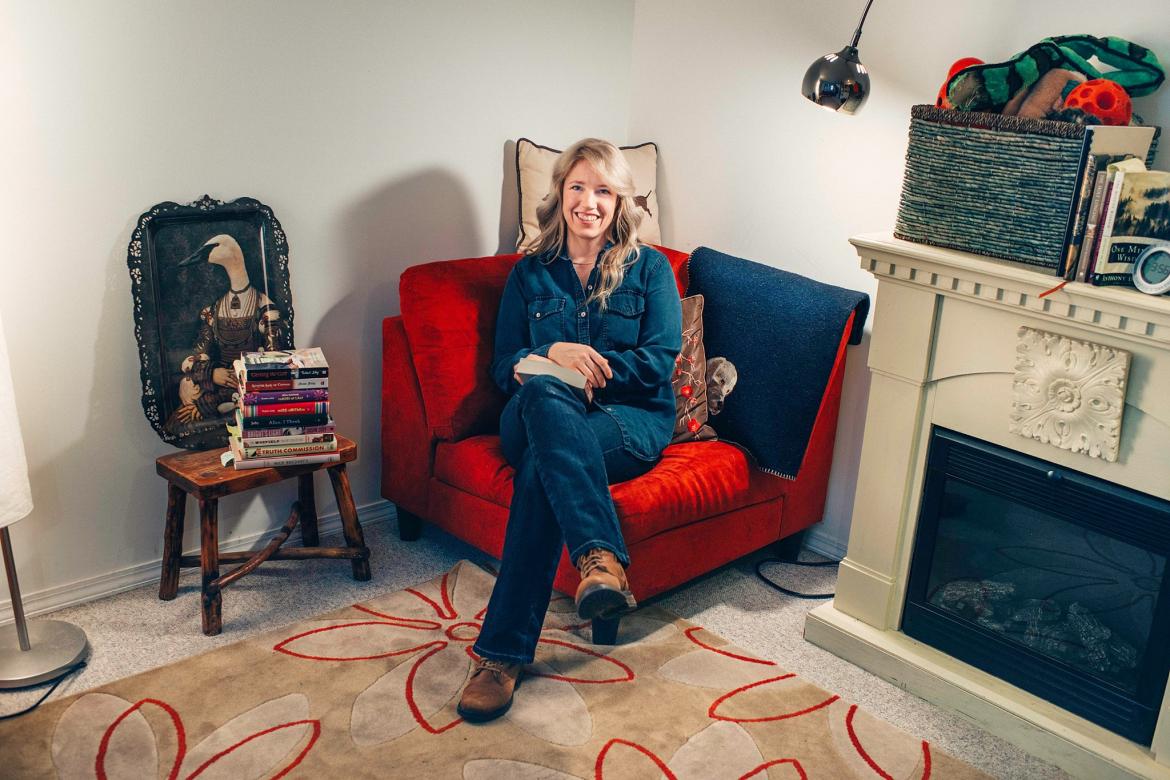
January 4, 2017 - 3:30pm
For Susan Juby, a VIU Creative Writing professor, 2016 has been a good year. She won the Sheila A. Egoff Children’s Literature prize for The Truth Commission, then the Stephen Leacock Medal for Humour for Republic of Dirt. This year also saw her win the City of Nanaimo’s Excellence in Culture Award and she is also the Whistler Writing Society’s Writer-in-Residence. Despite how busy her year has been – did we mention she’s also working on a new book! – Susan set aside a bit of time to answer our most burning questions:
First of all, can we start by saying how grateful we are that your career as an aspiring fashion designer was unsuccessful.
You and my bank account and self-esteem are in agreement about that.
When did you first start writing and why?
I started writing stories as soon as I learned how to make sentences. I wrote because I loved reading. Being a writer seemed extremely important and glamorous. I still think it’s important. I may have been wrong about the glamorous part.
What was your goal when you started writing your first novel — Alice, I Think — which follows the development of an oddball teenager who has the courage to make her own way in life?
I had a long fallow period and didn’t write any fiction from the time I was 13 until I was 27. When I began Alice, I Think I had no idea I’d embarked on a novel. The plan was to write every day without worrying about whether the writing was good. All that mattered was getting words down.
How did it impact your career and life when the Alice trilogy was made into a TV series?
That experience was gratifying on several levels. The producers, CTV and the Comedy Network were generous with me and they hired talented, smart, funny people. I was given all the scripts to read and was invited to the set several times. I was even given a cameo. I played Customer #2 and made a hash of the role. There was also a nice payday, most of which I spent on a horse. My excuse was that I needed my own horse in order to research a new novel. Turns out, you should have a long-running, syndicated US network TV show before you go buying horses. Lesson learned. Having a novel turned into a TV show was a fascinating experience.
You love oddball characters! Do you think it’s harder these days for a youth to be an eccentric youth who doesn’t fit in?
In some ways it might be easier today because eccentrics who are old enough to go online can find like-minded people. With the splintering of popular culture into countless fragments, there are more places to belong. On the other hand, it’s still tough to be in high school and bombarded with messages about how you should look and act and who you should be.
You’ve won and been nominated for a number of awards over the years, but this year is a particularly good one for you — first being awarded the Excellence in Culture Award by the City of Nanaimo, then winning the Sheila A. Egoff Children’s Literature prize for The Truth Commission, then the Stephen Leacock Medal for Humour for Republic of Dirt, then being named the Whistler Writing Society’s Writer-in-Residence. What words best sum up this year for you so far?
It’s been a bit shocking. I was exhausted after publishing two books (The Truth Commission and Republic of Dirt) two months apart in 2015. The lovely recent acknowledgement of my work has put some spring in my step again.
How do the stories in your novels come to you?
I’m inspired by everything – minor characters in novels, overheard snippets of conversation, news stories, fears, obsessions. Most of the stories start with a whisper in my ear in the voice of a character who will take over my brain for the next year or two.
You often use humour to tackle hard themes in your novels. Why is humour in writing so important?
Humour makes life bearable and can help us gain perspective on nearly any situation. Many of the writers I admire most are at once funny and deeply serious. Some, like P.G. Wodehouse, are confections of comic genius.
You tackle the tough issues of alcoholism and child neglect in your novels…do you get a lot of feedback from people who are or were in these situations? If so, how do you handle that?
It’s gratifying when people write to me and share their stories or let me know what my novels have meant to them. If people are looking for help, I do my best to refer them to good resources.
When did you first discover you were funny?
I’m funnier on the page than I am in person. Very disappointing for my dreams of becoming a stand-up. My first indication that I could make people laugh came when I started writing ridiculous emails to friends and they began to pass them around. That was all the encouragement I needed.
Your first novel is set in the town you grew up in, and the Woefield series is set where you live now. What is it about familiar places that is so appealing?
I prefer to write about smaller places. I’ve lived in Toronto and Vancouver, but haven’t been tempted to use them as settings for my fiction. There’s always something about the characters or the mood of the story that fits the location I use. The more specific and peculiar a setting, the more appealing I find it.
Since some of the things you write about are based on your experiences, we were wondering if there is a real-life Eustace (the tall, handsome, handy veterinarian in the Woefield series)?
Alas, no. I haven’t met such a person. In a perfect world a Eustace-like individual would be saving animals and turning heads all over the mid-Island region. I suspect people would be much more diligent about getting their livestock regular check-ups if he existed.
How come you know so much about chickens and mules?
When I was growing up my family kept chickens and a group of us kids became obsessed with them. We found them incredibly funny, what with their odd ways and peculiar noises. I always visit the poultry barn at agricultural fairs. As for mules, I read several books about them in preparation to write Republic of Dirt. They seem like charming creatures. I was a little afraid to meet an actual mule lest I fall in love and end up buying one. I have no need of a mule.
What are some of your biggest inspirations when you’re writing?
My inspirations depend on the project. Being a novelist is the perfect career for a serial enthusiast. I believe the technical name for it is dilettante. At the moment I’m deep into the finer points of floral design.
What’s the most important thing you would like people to take away when they read one of your novels?
That depends on the book. At the most basic level I’d like people to forget their troubles for a time and come away with the sense that life is an absurd but worthy endeavor.
What book are you reading right now?
Paula Pryke’s Flower School: Mastering the Art of Floral Design.
How did you end up in Nanaimo and working at VIU?
When my husband, James, and I lived in Vancouver we often came to Nanaimo to visit my dad, Bill Juby, who taught in the English Department. We fell in love with Nanaimo and I set my sights on getting a teaching job at VIU. James teaches in the business program.
What’s your favourite part about your job at VIU?
The students are smart, engaged, enthusiastic and they come from all sorts of backgrounds. I’m also glad to work with the stellar staff and faculty at VIU. It’s a friendly and supportive place and I particularly like the fact that we’re able to get to know our students. That’s one of the benefits of teaching at a smaller school.
Are there any special spots at the University where students might find you writing?
I can’t tell because if people knew they’d probably come by to bring me coffee and I’d get distracted.
In 2014, you were appointed by the Royal Society of Canada to its College of New Scholars, Artists and Scientists, a group of academics that represent the emerging generation of Canadian intellectual leadership. What do you hope to get out of being a part of this group?
It’s important for VIU to be recognized at the national level for the work we do. It’s inspiring to sit in on sessions led by members in the various disciplines. I hope to contribute by volunteering for one of the committees before the end of my tenure in the College.
Tell us a bit about what you’re working on right now.
I’m at work on a comedic crime novel for adults. That’s all I can say about it right now, but I’m having a wonderful time writing and researching it. The Fashion Committee, set at the same fictional art high school as The Truth Commission, will be out next summer.
Give us three random facts about yourself that your fans might not know.
- I’m the caretaker of a 10-year-old Canada Day cupcake. It lives in my snack drawer and every Canada Day I post a photo of it on Facebook. It looks the same as it did the day I bought it. At the time I’d developed a bit of a cupcake habit and my husband suggested that they were not completely biodegradable. I kept one as an experiment and it turns out, he was right. Some people take up fencing or learn new languages. I keep old cupcakes.
- I walk nearly two hours a day. Walking gets the creative engine primed and it’s good for people who have cattle dogs.
- It’s common for me to bring two or three beverages to class. A coffee, a soy beverage and a large water. It’s important to be well-hydrated.
Who has inspired or mentored you in your life?
My high school English teacher was an important mentor. My dad, my godfather, my mother. Lots of other writers, including my talented colleagues in the Department of Creative Writing and Journalism. My students also inspire me.
*Check out more stories from the latest issue of VIU Magazine here.
Tags: VIU Magazine






